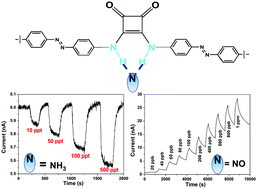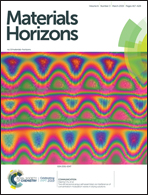Ultrasensitive and robust organic gas sensors through dual hydrogen bonding†
Abstract
High sensitivity and good robustness of organic gas sensors are critical for practical applications but usually contradictory and cannot be satisfied simultaneously. In this work, we demonstrated that this conflict can be solved through dual hydrogen bonding (DHB) in designing sensory molecules. Polysquaramide-based chemiresistors can detect ammonia with a lower limit (LOD) of 10 parts-per-trillion (ppt) at room temperature (25 °C), which is the lowest among all reported ammonia sensors usually with LODs in the part-per-billion (ppb) range. Meanwhile, the sensor can sense nitric oxide as low as 20 ppb. Surprisingly, the sensor has better robustness compared to most counterparts, including faster response/recovery, higher selectivity, reproducibility across a batch of devices, time stability for >240 days, and process-insensitivity. DHB from squaramide to NH3/NO produces higher binding energy and affinity, greatly enhancing the sensitivity and keeping the reversibility. Our results open a new way to design organic materials for ultrasensitive and robust gas sensing.



 Please wait while we load your content...
Please wait while we load your content...